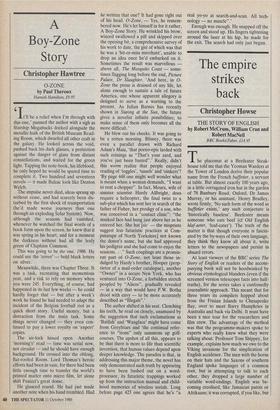A Boy-Zone Story
Christopher Hawtree
0-ZONE by Paul Theroux
Hamish Hamilton, f9.95
61 t'll be a relief when I'm through with this one,' punned the author with a sigh as Starship Megabucks docked alongside the metallic hulk of the British Museum Read- ing Room, which dwarfed all other craft in the galaxy. He looked across the void, pushed back his dark glasses, a protection against the danger of glare from distant constellations, and waited for the green light. Tapping the note-book, his lifeblood, he only hoped he would be spared time to complete it. Two hundred and seventeen novels — it made Balzac look like Denton Welch.
The impulse never died, ideas sprang up without cease, and had scarcely been dis- turbed by the first shock of transportation (he'd made worse journeys than one through an exploding Solar System). Now, although the seasons had vanished, whenever he watched the final words of a book form upon the screen, he knew that it was spring in his heart, and for a moment the darkness without had all the leafy green of Clapham Common.
This was going to be the one. 1986. He could see the 'cover' — bold black letters on silver.
Meanwhile, there was Chapter Three, It was a task, recreating that momentous year, and a risk to rely on memory when you were 245. Everything, of course, had happened in its last few weeks — he could hardly forget that — but after a week's work he found he had needed to adapt the incident of the Belgian football riot as a quick short story. Useful money, but a distraction from the main task. Some things never changed — they even con- tinued to pay a lower royalty on 'export' copies.
The air-lock hissed open. Another `morning's' read — time was serial now, not circular — and he should have enough background. He crossed into the oblong, flat-roofed Room. Lord Thomas's heroic efforts had been in vain, for there had been little enough time to transfer the world's printed matter onto micro film, let alone shift Panizzi's great dome.
He glanced round. He had just made another note when his hand trembled. Had he written that one? It had gone right out of his head. 0-Zone, — Yes, he remem- bered now. He's let himself in for it rather, A Boy-Zone Story. He wrinkled his brow, winced swallowed a pill and skipped over the opening bit, a comprehensive survey of his work to date, the gist of which was that he was a 'hit-or-miss merchant', unable to drop an idea once he'd embarked on it. Sometimes the result was marvellous above all, The Mosquito Coast — some- times flagging long before the end, Picture Palace, Dr Slaughter. 'And here, in 0- Zone the prose is drained of any life, let alone enough to sustain a tale of future America, one whose apparent allegory is designed to serve as a warning to the present. As Julian Barnes has recently shown in Staring at the Sun, the future gives a novelist infinite possibilities; to make sense of them only becomes all the more difficult.'
He blew out his cheeks. It was going to be a rotten morning. Blimey, there was even a parallel drawn with Richard Adam's Maia, 'that porno-epic larded with such coinings as "That's your zard, and you've just been basted".' Really, didn't this worm realize that people enjoyed reading of 'toggles', 'tassels' and 'oinkers'? `By page 448 one might well wonder what is meant when a woman demands, "I want to rent a chopper". In fact, Moura, wife of sinister scientist Hardy Allbright, does require a helicopter, the final twist to a sub-plot which has sent her in search of the father of Fisher, her prodigy of a son, who was conceived in a "contact clinic": "the masked face had hung just above her as he entered her. She hat [sic — the misprints suggest less futuristic practices at Coin- putatape of North Yorkshire] not known the donor's name, but she had approved his pedigree and she had come to enjoy the sessions. . ." Such couplings are a promin- ent part of 0-Zone, not least those in- dulged by Hardy's brother, Hooper (prop- rietor of a mail-order catalogue), another "Owner" in a secure New York, who has ventured into 0-Zone, a forbidden stretch peopled by "Aliens", gradually revealed — in a way that would have P.W. Botha drool with envy — to be more accurately described as "Illegals".'
The author shifted in his seat. Clenching his teeth, he read on closely, unamused by the suggestion that such exclamations as `Batfish' and Wangface' might have come from Greyfriars and 'the continual refer- ence to "irons" only summons up golf- courses. The upshot of all this, appears to be that there is more to life than scientific invention, that human values depend upon deeper knowledge. The paradox is that, in addressing this major theme, the novel has only demonstrated such truth by appearing to have been bashed out on a word- processor, its futuristic trappings worked up from the instruction manual and child- hood memories of wireless serials. Long before page 423 one agrees that he's "a real yo-yo at search-and-scan. All tech- nology — no muscle".'
Enough was enough. He snapped off the screen and stood up. His fingers tightening around the laser at his hip, he made for the exit. The search had only just begun.


























































 Previous page
Previous page